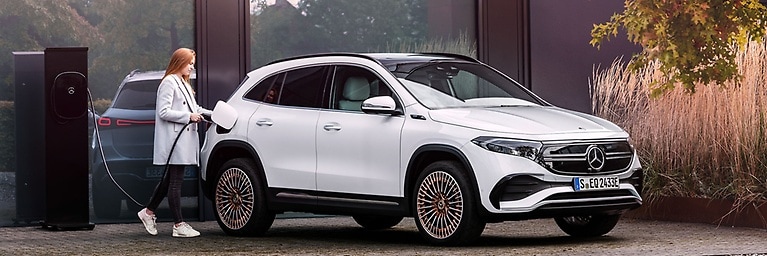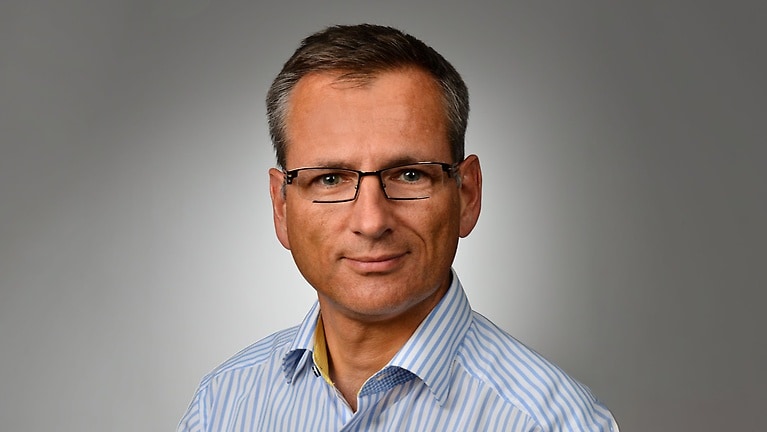
Mercedes-Benz Mobility AG
Siemensstr. 7
70469 Stuttgart
Deutschland
Tel.: +49 711 17 0
E-Mail: mobility@mercedes-benz.com
Please send queries about content on this website to any contact. You can address your concerns to us in English and your respective national language.
Represented by the Board of Management: Franz Reiner (Chairman), Jörg Lamparter, Susann Mayhead, Tolga Oktay, Peter Zieringer
Chairman of the Supervisory Board: Harald Wilhelm
Commercial Register Stuttgart, No. HRB 737788
VAT registration number: DE 81 11 20 930

Mercedes-Benz is launching a pilot project for smart charging solutions for fleets together with the energy supplier EWE, the Research Centre for Energy Economics (FfE) and The Mobility House, a provider of charging solutions. For this purpose, the car manufacturer is operating 10 Mercedes-EQ models in the fleet of Wernsing Feinkost (Oldenburg in Germany). The pilot test aims to gain insights into how to improve grid stability and to identify potential savings in energy costs. At the same time, the all-electric vehicles are supposed to be charged by renewable energy sources whenever possible. The pilot project is part of the Germany-wide research project "unIT-e² - Reallabor für verNETZte E-Mobilität" and is one of four sub-projects under the name "Harmon-E".
The electrification of the mobility sector is a key element of the energy transition. While the share of renewable energy sources is increasing, electric mobility is also growing more and more as a consumer of green electricity. At the same time, the large-scale integration of e-mobility into the energy system is accompanied by a significant increase of the electricity demand, which increases the complexity in the energy system and demands new solutions for intelligent load management.
In this pilot project, Mercedes-Benz is developing technical solutions und customer oriented services for smart charging on the vehicle side to serve the grid. Overall target of this pilot project is the usage of vehicle batteries to increase the flexibility within the electricity grid. In testing the innovative smart charging solutions, Mercedes-Benz is focusing in particular on making the charging processes more flexible and thereby reducing energy costs as well as CO2 emissions while at the same time stabilizing the electricity grid.
The operational vehicle fleet includes 10 all-electric Mercedes-EQ models (EQA, EQB, EQC and EQS), which Wernsing obtains on a long-term rental basis from Mercedes-Benz Rent. They are used by the employees for both private and work related purposes and are mostly moved between home and work.
The project unIT-e², funded by the Federal Ministry of Economics and Climate Protection (BMWK), has therefore set itself the goal of intelligently and safely integrating electric mobility into existing and future infrastructures in order to meet the transformation of the energy system. A total of 29 project partners from the automotive and energy industries, IT and charging infrastructure as well as science are developing future-proof solutions for interoperable charging concepts for electric vehicles in four clusters across Germany. The Harmon-E cluster, in which the nine-month pilot project is being carried out at Wernsing Feinkost GmbH is focusing on the harmonious interaction of the overall system.
Please find further information on unIT-e² and the Harmon-E cluster here:
![[spennemann_frank_klein:MEDIASTORE_LEAF]@1c7e1226](/bilder/mbm-relaunch/wer-wir-sind/stories/smart-charging-of-fleets/spennemann_frank-klein_ratio_16x9_s.jpg)
As a car manufacturer, we want to offer customers maximum convenience while minimising costs when charging. By intelligently predicting departure times and required battery charging states for planned journeys, we can optimally control the charging process. Thus, electric vehicles should always be charged when electricity is either cheap or green, which usually even occurs at the same time.

The pilot project covers one key charging point in daily life: Charging at work. Employees from Wernsing use a fleet of ten Mercedes-EQ models in their everyday professional life. They charge primarily at the newly installed charging infrastructure at Wernsing's site in Oldenburg where the smart charging solutions will also be tested. Charging at home of in public is still possible but not the main focus of the pilot project.
We pay a lot of attention to scalability in the development and testing of the technical solutions in this pilot project. The findings from this project will be incorporated into future products and digital services at Mercedes-Benz.